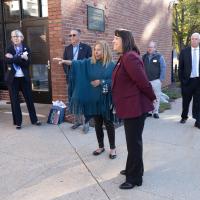
Westfield State’s WISE Program Pioneers Active Learning and Complex Problem Solving

Westfield State University is making strides in reimagining its general education curriculum, known as the Westfield Integrative Student Experience (WISE), by introducing rigorous, engaging courses earlier in students' academic journey.
Westfield State University is making strides in reimagining its general education curriculum, known as the Westfield Integrative Student Experience (WISE), by introducing rigorous, engaging courses earlier in students' academic journey. This shift aims to make classes more interactive and impactful, as general education comprises about one-third of a college student's education and serves as a foundation for skills needed in major-specific courses.
Central to the new curriculum are High-Impact Practices (HIPs), evidence-based learning approaches that enhance knowledge retention, engagement, and application. These practices, endorsed by the American Association of Colleges and Universities, include service learning, undergraduate research, internships, capstone projects, and writing-intensive courses, among others.
“We’re working to make sure that the new classes for WISE have high-impact practices embedded in them,” explained Beverly Army Williams, Executive Director of General Education at Westfield State. She also emphasized that faculty support and training are key components in successfully incorporating these active learning techniques into the curriculum. “We’ll also be helping to support faculty to know how to incorporate them into their classes, so if there’s something unfamiliar to them, we can find ways to help them learn how to do it, because it’s so important.”
A unique feature of the WISE program is its requirement for students to complete three courses that tackle complex real-world issues, beginning in their second semester. “This is where students devote a significant amount of time to exploring and tackling authentic and real life, complex problems over the course of a semester,” Dr. Lynn Shelley, Professor of Psychology, said. “And so rather than teaching basic skills before having students engage with these problems, we’re having the students tackle them very early, right in their second semester. By the time they begin taking major-specific courses, they’re already used to having meaningful interactions with their peers and professors about issues that really matter.”
Courses like Science for Future Presidents, taught by Dr. Carsten Braun of the Geography, Planning, and Sustainability Department; The Complex Journey of Pregnancy, co-taught by Dr. Robin White and Dr. Jessica Stephens of the Biology Department; and Declassifying Social Class, taught by Dr. Sophia Sarigianides in the English Department, are prime examples of interdisciplinary courses in the WISE program. “Students engage with a level of creativity and critical thinking that allows them to approach complex problems from a variety of angles,” Army Williams noted.
"I have been teaching about social class--both in my courses for English teachers, but also for a range of majors through an honors seminar for about five years now," Dr. Sophia Sarigianides remarked. "I also teach about other social issues in my courses, but I have never had the kind of response about a topic that I have for social class. I take a sociocultural approach, focusing on the feelings and beliefs of being classed subjects, and this approach, I think, brings out a host of poignant responses in students. The strongest responses have been from first-generation students, many of whom are also working-class. I am so hopeful about the impact that a course like this could have on other first-generation students, students like myself, and how it might build understanding around social forces and their effects on us early in students' learning experiences in college."
"I think WISE is the idea of reframing 'the common core' into an integrative student experience that bridges across our traditional academic disciplines and majors," Dr. Braun added. "The course Science For Future Presidents was perhaps a little ahead of its time when we created 10 years ago as a collaboration between myself, Professor Tim Parshall of Environmental Science Department, and Professor Frank Giuliano of the Chemical & Physical Sciences Department. The idea behind the course was to explore the complex scientic issues that that future presidents, or anyone else, need to understand and appreciate to make informed and responsible decisions."
Dr. White echoed these enthusiastic sentiments, commenting, “We are incredibly excited to teach this course as part of the new WISE curriculum. We strongly feel that, regardless of a student’s major or career aspirations, they will benefit from the opportunity to explore multifacted ‘real-world’ topics such as pregnancy early in their college experience. We are particularly looking forward to each student’s contributions to the class based on their lived experiences, and we expect to learn a lot ourselves.”
To ensure the WISE curriculum meets student needs, continuous assessment and feedback loops are central to the program. First-year and senior students participate in regular surveys to evaluate how well the program is achieving its educational goals. “Our hope in The Special Committee on Reforming General Education (SCORE) is that we’ll see whether all the work we’re doing to help students build community and feel at home in Westfield State will pay off,” Army Williams added. “By senior year, we’ll be able to see that, so there are plans in place to evaluate this data and know how to better help others navigate their life as a college student. These are all working documents that we want to be a flexible, nimble thing. If we realize this isn’t working the way we thought it would, we’ll be able to shift, change, and improve.”
Dr. Shelley echoed this commitment to adaptability, saying, “We’re making these changes in real time as well, which is how a curriculum should be. Approaches should change as you work with them, and as you find their flaws and strengths. As a result of what faculty have already been finding is that in the long run, changes to the curriculum are going to be the success of this program. It’s going to continuously adapt as we live with it.”
With WISE, Westfield State University is setting a new standard for general education by offering an engaging and adaptive learning experience that prepares students to think critically and creatively about real-world issues from the beginning of their college journey.


